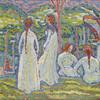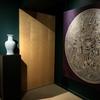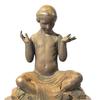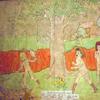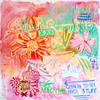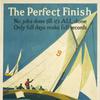The Davis Museum at Wellesley College Celebrates Shakespeare’s Influence on Art in "That Right Promethean Fire: Shakespeare Illustrated"
- WELLESLEY, Massachusetts
- /
- January 25, 2016
On February 10, 2016, the Davis Museum at Wellesley College will present That Right Promethean Fire: Shakespeare Illustrated, an exhibition that celebrates the 400th anniversary of William Shakespeare’s death with works of art that explore Shakespeare’s plays. Featuring works of art from the 17th to the 21st centuries, the exhibition will include masterpieces from John Boydell’s Shakespeare Gallery, a project began in 1786 that included a collection of paintings by various artists, then translated into a large-format print series, and finally into an illustrated edition of Shakespeare’s plays. The exhibition will be on view through June 5, 2016.
Wellesley College’s rich collection of Shakespeare-related works from the Davis Museum and Special Collections will illustrate the comprehensive nature of Boydell’s project. In addition, works by Angelika Kaufmann, Eugène Delacroix, Arthur Rackham, Oskar Kokoschka, and Max Beckmann will demonstrate sustained artistic engagement with the Bard’s remarkable stories.
“We are presenting pockets of time when artists referred to Shakespeare’s stories to make their own creations,” said exhibition curator Meredith Fluke, Kemper Curator of Academic Programs. “From gifts bestowed to the Davis Museum collection, as well as the collaborative efforts of the different facets of the College, the exhibition will highlight the artistic tradition of illustrating Shakespeare’s treasures, as well as Wellesley’s profound interest in Shakespeare over more than a century of time.”
There will be an exhibition on view at the Wellesley College library in conjunction with Shakespeare Illustrated. The library will display books from the collection of the Wellesley College Shakespeare Society, which was founded in 1877 by the founder of the College, Henry Fowle Durant, and remains the oldest continuous society on campus.
William Cain, the Mary Jewett Gaiser Professor of English at Wellesley College, and Ruth Rogers, Curator of Special Collections at Clapp Library, served as advisors to the exhibition.
Shakespeare Illustrated and related programs are supported through the generosity of Wellesley College Friends of Art, now celebrating 50 years of giving. The Susan and Donald Newhouse Center for the Humanities festival is supported by The Robert E. Garis and Arthur Gold Fund, The Moffet Fund, and CLCE.
EXHIBITION-RELATED PUBLIC PROGRAMS
THROUGHOUT WELLESLEY COLLEGE
STUDENT PERFORMANCE
“More than Words can Witness”: Performances by Members of the Wellesley College Shakespeare Society
Saturday, February 27, 2016, 3 p.m.
Davis Galleries
Students from the Wellesley College Shakespeare Society will provide a lively in-gallery performance inspired by the works on display in the Davis Museum. The audience is invited to a conversation with the actors following the performance, discussing the relationship between theater and visual art, and the special history of Shakespeare at Wellesley.
FILMS
Shakespeare on the Global Silver Screen
Presented to expand upon the special exhibition That Right Promethean Fire: Shakespeare Illustrated, this selection of six films demonstrates the sustained and diverse engagement with Shakespeare that has inspired filmmakers around the world for nearly a century. This film series is generously supported by the Davis Museum Film Program Gift, and co-hosted by the Cinema and Media Studies and English departments.
All screenings take place in Collins Cinema beginning at 6:30 p.m. (except where noted)
February 24: “Hamlet” (1921, Dir. Asta Nielsen)*
Asta Nielsen, born in Denmark in 1881, was the first diva of European silent film. To realize her artistic vision she founded her own company, Art-Film, in 1920. Her production of Hamlet, produced that same year, features a female Hamlet character and initially survived only in a black-and-white US export version. A colored vintage print of the lost German original version of 1921 was discovered in 2005. The restored film had its premiere at the Berlinale in 2007, with new musical accompaniment composed by Michael Riessler (Source: Edition Filmmuseum).
March 9: “Throne of Blood” (1957, Dir. Akira Kurosawa)*
A vivid, visceral Macbeth adaptation, “Throne of Blood,” sets Shakespeare’s definitive tale of ambition and duplicity in a ghostly, fog-enshrouded landscape in feudal Japan. As a hardened warrior who rises savagely to power, Toshiro Mifune gives a remarkable, animalistic performance, as does Isuzu Yamada as his ruthless wife. “Throne of Blood,” fuses classical Western tragedy with formal elements taken from Noh theater to create an unforgettable cinematic experience (Source: The Criterion Collection).
April 13: “Chimes at Midnight” (1965, Dir. Orson Welles)
One of the few films over which Orson Welles wielded complete creative control, “Chimes at Midnight,” is a creative, combinatory adaptation of Shakespeare’s Henry IV and The Merry Wives of Windsor. Among Welles’ most moving films, “Chimes at Midnight,” reveals the relationship between Falstaff and Prince Hall to be Shakespeare’s nuanced reflection on the difficult gap between political power and its human instrument. (Source: Harvard Film Archive).
May 4: “Omkara” (2006, Dir. Vishal Bhardwaj)
In this Indian Bollywood adaptation of Shakespeare’s Othello, Omkara, or “Omi,” is a gifted chieftain who heads a gang of outlaws, which include the crafty Langda Tyagi and the dynamic Kesu amongst his chief cohorts. When Omi appoints Kesu and not Langda as his chief lieutenant, Langda's pride is slighted and raging with envy, he hatches a plot to falsely implicate Omi's beautiful fiancee Dolly, in an illicit affair with Omi's favourite lieutenant, Kesu. Using petty insinuations and lies, Langda keeps poisoning Omi's mind till one day he snaps and goes amok tearing up his secure world, leading up to a horrific tragedy at the end of which Omi realizes the backlash of his actions. But is it too late? (Source: Eros International).
*indicates special presentation in 35mm
Special event! Valentine’s Day Double Feature and Student Party
Sunday, February 14
The Davis Museum and the Davis Museum Student Advisory Committee (DMSAC) team up to celebrate Valentine’s Day with a special showing of two beloved 90’s film adaptations of Shakespeare’s most romantic works: “Romeo + Juliet” (starring Claire Danes and Leonardo DiCaprio) and “10 Things I Hate About You” (starring Julia Stiles, Heath Ledger and Joseph Gordon-Levitt).
Noon: “Romeo + Juliet” (1996, Dir. Baz Luhrmann)
Starring Claire Danes and Leonardo DiCaprio
2 p.m.: Student Party hosted by the DMSAC
Between screenings, students are invited to join DMSAC for sweet treats in the Davis lobby.
3:30 p.m.: “10 Things I Hate About You” (1999, Dir. Gil Junger)
Starring Claire Danes and Leonardo DiCaprio
GALLERY TALK
Tuesday, March 1, 4 p.m.
Davis Galleries
Join Meredith Fluke, Kemper Curator of Academic Programs, Ruth Rogers, Curator of Special Collections at the Clapp Library, and William Cain, Mary Jewett Gaiser Professor of English at Wellesley College in a discussion about Shakespeare, and the enduring and multifarious practice of interpreting his work.
FESTIVAL HOSTED BY THE SUSAN AND DONALD NEWHOUSE CENTER FOR THE HUMANITIES
Shakespeare on the Global Stage, April 23-27
To celebrate the global reach of Shakespeare on the 400th anniversary of his death, the Newhouse Center will host a festival that features an intercultural performance (with surtitles) of A Midsummer Night's Dream by Yohangza, an internationally acclaimed theatre troupe from Korea. The company is especially renowned for its exhilarating adaptations of Western classics in a unique theatrical idiom that combines traditional Korean practices with a global and modern sensibility. As part of the Festival, actors will offer performance workshops while eminent scholars from around the world will highlight the on-going and volatile evolution of Shakespeare from the original Globe stage to the global stage: Tiffany Stern of Oxford University, the world's foremost expert on Shakespeare's original practices; and Hyonu Lee, Korea's leading scholar of Shakespearean intercultural adaptations. Stephen Greenblatt, the Pulitzer-winning Shakespeare scholar from Harvard University, will close the Festival. Presented with support from The Robert E. Garis and Arthur Gold Fund, The Moffet Fund, and CLCE.
“Shakespeare on Stage at the Globe” | Tiffany Stern, Oxford University
“Shakespeare on the Global Stage” | Hyonu Lee, Soon Chun Hyang Univerisity
Saturday, April 23, 4:15 p.m.
Collins Cinema
Reception in the Alumnae Ballroom
Saturday, April 23, 6 p.m.
Yohangza Performance (with surtitles), “Midsummer Night’s Dream”
Saturday, April 23, and Sunday, April 24, 7 p.m.
Alumnae Hall
Distinguished Thinkers at the Newhouse Center
“Traveling Shakespeare: Plays in Motion”
A Talk by Stephen Greenblatt
Tuesday, April 27, 7 p.m.
Collins Cinema
Stephen Jay Greenblatt is an American critic, theorist, scholar, and Pulitzer Prize winning author. He is the John Cogan University Professor of the Humanities at Harvard University, the editor of the The Norton Shakespeare (2015) and a contributor to the Norton Anthology of English Literature. He won the Pulitzer Prize for General Nonfiction in 2012, and the National Book Award for Nonfiction in 2011, for The Swerve: How the World Became.
https://www.wellesley.edu/davismuseum/
About Davis Museum
One of the oldest and most acclaimed academic fine arts museums in the United States, the Davis Museum is a vital force in the intellectual, pedagogical and social life of Wellesley College. It seeks to create an environment that encourages visual literacy, inspires new ideas, and fosters involvement with the arts both within the College and the larger community. ABOUT WELLESLEY COLLEGE AND THE ARTS The Wellesley College arts curriculum and the highly acclaimed Davis Museum are integral components of the College’s liberal arts education. Departments and programs from across the campus enliven the community with world-class programming– classical and popular music, visual arts, theatre, dance, author readings, symposia, and lectures by some of today’s leading artists and creative thinkers–most of which are free and open to the public. Since 1875, Wellesley College has been the preeminent liberal arts college for women. Known for its intellectual rigor and its remarkable track record for the cultivation of women leaders in every arena, Wellesley—only 12 miles from Boston—is home to some 2300 undergraduates from every state and 75 countries.




